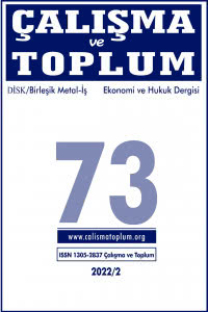İşçilerin Sendikalara Yönelik Tutum ve Davranışları; Kocaeli Örneği
Workers’ Attitudes and Behaviours Towards the Trade Unions; The Case of Kocaeli
___
- Adaman, Fikret, Ali Çarkoğlu, Burhan Şenatalar: Household View on the Causes of Corruption in Turkey and Suggested Preventive Measures, TESEV, İstanbul, 2002.
- Akkaya, Yüksel: “ Küreselleşme Kıskacında Türkiye’de İşçi Sınıfı ve Temel Özellikleri”, Petrol-İş Yıllığı 2002-2003, İstanbul, 2003.
- Ansal Hacer vd.: Türkiye Emek Piyasasının Özellikleri, İstanbul, Türkiye Ekonomik ve Toplumsal Tarih Vakfı, 2000.
- Buğra, Ayşe, Fikret Adaman, Ahmet İnsel: Çalışma Hayatında Yeni Gelişmeler ve Türkiye’de Sendikaların Değişen Rolü, Boğaziçi Üniversitesi Sosyal Politika Forumu Araştırma Raporu.
- Çelik, Aziz, Kuvvet Lordoğlu: “Türkiye’de Resmi Sendikalaşma İstatistiklerinin sorunları Üstüne” www.calismatoplum.org/sayi9/celik_lordoglu.pdf, s. 27, 19.01.2007.
- ÇSGB: Çalışma Hayatı İstatistikleri, Ankara, 2006.
- Gökçe, Birsen: “Türkiye’nin Toplumsal Yapısını Etkileyen Siyasal ve Toplumsal Öğeler”, Ulusal Sorunlar ve Demokratik Çözüm Yolları, Der.İlhan Azkan, Ekin Kitapevi, İstanbul, 2001.
- Işıklı, Alpaslan: “ Ücretli Emek ve Sendikalaşma”, Geçiş Sürecinde Türkiye, 2.bs. Der. Irvin Cemil Schick, Ertuğrul Ahmet Tonak, İstanbul, Belge, 1993.
- Koray, Meryem: Değişen Koşullarda Sendikacılık, TÜSES, İstanbul, 1994.
- Kutal, Metin: “Küreselleşme Sürecinin Türk Sendikacılığı Üzerindeki Olası Etkileri”, Prof. Dr. Kemal Oğuzman’a Armağan, 1997, Ankara.
- Petrol-İş, Sendikal Demokrasi, İstanbul, Petrol-İş Yayın No: 31, 1993.
- Şengül, Tarık H., “Türkiye’de Krizli Yılların Toplumsal Sonuçları”, İktisat Dergisi, Sayı:432, Aralık, 2002.
- Şenses, Fikret: “Neoliberal Ekonomi Politikaları, İşgücü Piyasaları ve İstihdam”, 2000-2003 Petrol-İş Yıllığı, İstanbul, 2003.
- Urhan, Betül: Sendikal Örgütlenme Bunalımı ve Türkiye’deki Durum, İstanbul, Petrol-İş Yayınları, 2005.
- Yeldan, Erinç. (2001); Küreselleşme Sürecinde Türkiye Ekonomisi, İletişim, İstanbul.
- ISSN: 1305-2837
- Yayın Aralığı: 4
- Başlangıç: 2003
- Yayıncı: DİSK Birleşik Metal-İş
50’leri İşçi Sınıfı Oluşumunun Kritik Bir Uğrağı Olarak Yeniden Okumak
Türkiye Emek Tarihinin Bir İzdüşüm Alanı Olarak ‘Edebiyat’
Sendika Hakkı, Toplu Sözleşme ve Grevi de İçeren Toplu Eylem Haklarını Kapsar mı?
İşçilerin Sendikalara Yönelik Tutum ve Davranışları; Kocaeli Örneği
Berna Güler MÜFTÜOĞLU, Elif HACISALİHOĞLU
